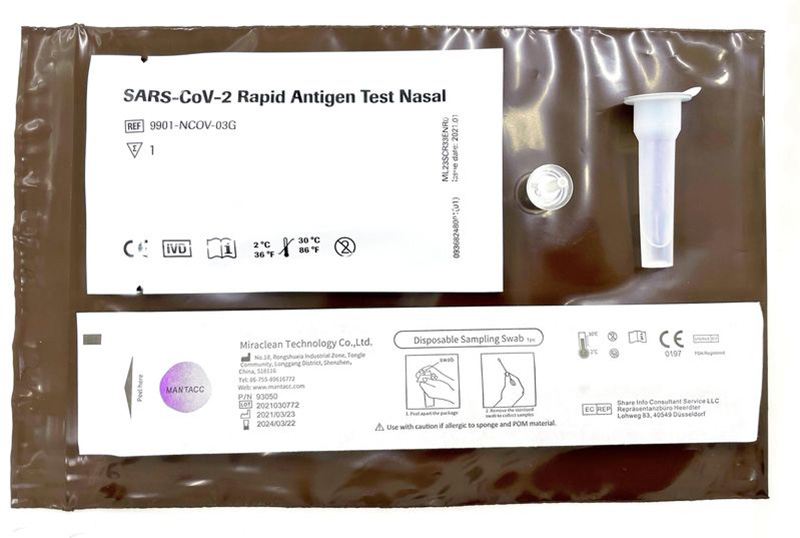
An antigen test kit
16:00 JST, January 28, 2022
Unexpectedly high demand for antigen test kits has prompted the curtailment of free coronavirus testing for people with no symptoms, which the government had been promoting to mitigate the spread of the omicron variant.
The administration of Prime Minister Fumio Kishida has been forced to change its policy after underestimating demand.
“We apologize for any inconvenience caused [by the policy change] but we need to make sure the testing kits are available when people are really sick,” Health, Labor and Welfare Minister Shigeyuki Goto said Thursday.
Goto said it might be difficult to get antigen testing kits at pharmacies and other stores for the time being, and asked for the public’s understanding. He also said that the free testing service provided by local governments had to be curbed because of the “expected scarcity” of testing kits.
On Dec. 23, the day after the first case of community-acquired infection was found in Osaka Prefecture, the prime minister said free testing would be available in prefectures where such cases were confirmed.
The free testing service was extended to prefectures neighboring those where community-acquired infections had occurred and a number of municipalities distributed free test kits to residents.
Such measures were taken as part of efforts to alleviate the anxiety of residents and contain the virus by swiftly detecting infections.
To limit coronavirus-related restrictions on activities connected to events and dining out, the government recommended widespread testing in its basic pandemic policy on Jan. 19, stating that testing would be free of charge.
The aim was to achieve a balance between pandemic-related restrictions and economic activities. However, the measure triggered a surge in demand for testing, leading to a shortage of kits in the medical field where tests are most needed.
According to a major wholesaler of test kits, orders have exceeded supply since the beginning of this month, and there have been a number of cases where orders have been refused or deliveries have been delayed.
The government has asked the industry to increase supply to 800,000 units per day, but the shortage is likely to continue for some time.
Ahead of the sixth wave of the pandemic, Kishida repeatedly stressed that he would “take preemptive action based on the worst-case scenario,” but the government has failed to secure enough inspection kits.
At a meeting of the Budget Committee of the House of Representatives on Tuesday, opposition lawmaker Kazunori Yamanoi of the Constitutional Democratic Party of Japan said, “In reality, the government didn’t anticipate the worst-case scenario, and ended up falling behind.”
Top Articles in Society
-

Man Infected with Measles Reportedly Dined at Restaurant in Tokyo Station
-

Man Infected with Measles May Have Come in Contact with Many People in Tokyo, Went to Store, Restaurant Around When Symptoms Emerged
-

Woman with Measles Visited Hospital in Tokyo Multiple Times Before Being Diagnosed with Disease
-

Australian Woman Dies After Mishap on Ski Lift in Nagano Prefecture
-

Foreign Snowboarder in Serious Condition After Hanging in Midair from Chairlift in Nagano Prefecture
JN ACCESS RANKING
-

Japan PM Takaichi’s Cabinet Resigns en Masse
-

Japan Institute to Use Domestic Commercial Optical Lattice Clock to Set Japan Standard Time
-

Israeli Ambassador to Japan Speaks about Japan’s Role in the Reconstruction of Gaza
-

Man Infected with Measles Reportedly Dined at Restaurant in Tokyo Station
-

Videos Plagiarized, Reposted with False Subtitles Claiming ‘Ryukyu Belongs to China’; Anti-China False Information Also Posted in Japan





















